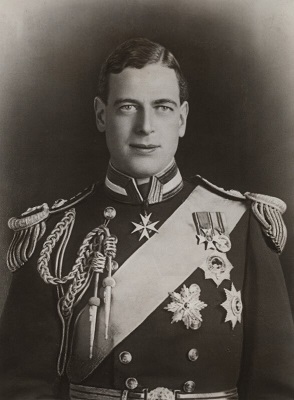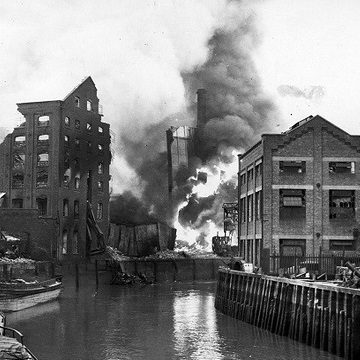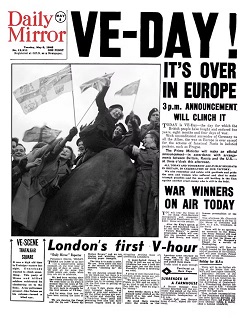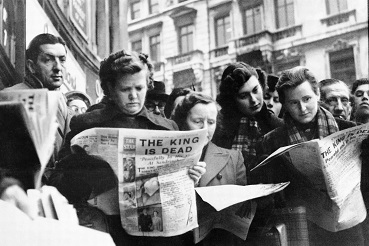The following paragraphs are kindly supplied by W Bro Neil Armstrong, researcher and Masonic historian:
A few days after Britain declared War, all Lodge and Chapter meetings were suspended. A letter was issued to all Lodges and Chapters as follows:
"Having regard to the emergency orders of His Majesty’s Government, I am to inform you that until further notice all Masonic meetings are to be suspended. It is hoped that this may only be a temporary measure." Grand Lodge also advised the “non-admission of brethren who are enemy aliens”.
 A month later Grand Lodge empowered Lodges to meet as early in the day as possible, if necessary to cancel any regular meetings and to alter dates without needing to obtain dispensation and instructed that festive boards should be kept as brief and simple as possible. Food rationing came in January 1940, so a cup of tea and a Spam sandwich was the order of the day.
A month later Grand Lodge empowered Lodges to meet as early in the day as possible, if necessary to cancel any regular meetings and to alter dates without needing to obtain dispensation and instructed that festive boards should be kept as brief and simple as possible. Food rationing came in January 1940, so a cup of tea and a Spam sandwich was the order of the day.
Dress for Lodge meetings would henceforth be morning dress or uniform and permission was given by Grand Lodge for gloves not to be worn during meetings as they were becoming difficult to obtain as all clothing needed coupons. Jewels were surrendered to be melted down as a contribution to the war effort. Cardboard jewels became the norm.
During the six long years that followed, there existed among the Brethren an almost tenacious fixation that meetings should still be held at all costs. Freemasonry itself was being threatened by persecution, the ten Grand Lodges of Germany had been dissolved. The Gestapo seized their membership lists, and thousands of members were sent to concentration camps, this being repeated across Europe.
 Like everywhere else, Masonic premises suffered heavily from bomb damage; halls were rendered unusable because of damage by blast and fire and this meant Lodges having to share premises. The basement of Freemasons’ Hall was used as an air-raid shelter.
Like everywhere else, Masonic premises suffered heavily from bomb damage; halls were rendered unusable because of damage by blast and fire and this meant Lodges having to share premises. The basement of Freemasons’ Hall was used as an air-raid shelter.
On the 25 August 1942 the then Grand Master, Air Commodore His Royal Highness the Duke of Kent was killed while on active service with the Royal Air Force. He was just one of many Freemasons who died in the war.
His successor, the Earl of Harewood was subsequently installed on 1st June 1943 by a Past Grand Master, the MW Bro His Royal Highness King George VI.
Other notable Freemasons who were involved in the war included US President Franklin D. Roosevelt, British Prime Minister Winston Churchill, French General Charles de Gaulle, and Polish pianist Wladyslaw Szpilman.
--ooOoo--
There are no Minerva Lodge minutes of meetings after July 1939 owing to the outbreak of the War in September of that year. Meetings afterwards were held somewhat spasmodically at 5:30 in the evenings, and ultimately at near midday until the end of the War, and the subsequent minutes reflect this. Nonetheless, twenty-two Candidates were initiated between September  1939 and September 1945. Austin regards this as low, as he remarks "but since that time the number of Initiations each year has been normal for the Minerva Lodge."
1939 and September 1945. Austin regards this as low, as he remarks "but since that time the number of Initiations each year has been normal for the Minerva Lodge."
In January 1940 food rationing began in the United Kingdom (and continued until 1954). From December 1939 a group of Cambridge students began a trial to prove that the UK could survive with only domestic food production in case the U-boats ended all imports. Using production data from 1938 they were fed one egg, 1lb of meat and 4oz of fish a week, 1/4 pint of milk per day, 4oz margarine and unlimited potatoes, vegetables and wholemeal bread. Intensive outdoor exercise was taken to stimulate the wartime physical work Britons would have to endure. The scientists found that health and performance remained very good after three months. Negative outcomes were the increased time it took to eat the meals, a 'remarkable' increase in flatulence due to the added starch and their faeces had increased in volume by 250%.
Aerial bombing by German forces began in Hull on 19th June 1940 until 17th March 1945. As a key port and industrial centre within easy flying distance from occupied Europe the city was an obvious target for air raids, and Hull experienced the worst bomb damage of anywhere outside London. For security  reasons, journalists were only allowed to refer to bombing in a "north east coastal town" so the rest of the country remained unaware that ninety-five percent of Hull's homes were destroyed or damaged by bombs.
reasons, journalists were only allowed to refer to bombing in a "north east coastal town" so the rest of the country remained unaware that ninety-five percent of Hull's homes were destroyed or damaged by bombs.
In May 1941 the Minerva Past Masters, sympathetic to those sister Lodges who had suffered damage to their buildings through enemy action and offered the Dagger Lane premises for their use. The building appeared to have a charmed life, and for several years the facilities were shared with Humber 57, Kingston 1010, De la Pole 1605, Wilberforce 2134, Lord Bolton 3263, Hull Old Grammarians 5129 and others.
In 1943 W Bro J R Ellerby (whose historical research has contributed much to these pages) "passed away since our last meeting at which he had deputised as Chaplain at a moment's notice. Initiated in 1914 he had worked assiduously for the Lodge and was always ready to assist in many degrees. He had attained the rank of PAGDC. Many Past Masters added their tributes which are faithfully recorded in the minutes."
 On May 8, 1945, known as VE Day (Victory in Europe), Germany unconditionally surrendered its military forces to the Allies and celebrations erupted around the world to mark the end of World War II in Europe. The following day, the Minerva Lodge Worshipful Master, W Bro Barney proposed a Toast on this day of National Rejoicing and Thanksgiving , to a "New and Better World." Recognising the WMs who had ruled the Lodge during the War Years - W Bros Essex, Crosby, Ryan and John Needler for their work, he concluded by quoting Field Marshall Montgomery's words "Let us embark on our New Venture with 'Joy and Optimism.'"
On May 8, 1945, known as VE Day (Victory in Europe), Germany unconditionally surrendered its military forces to the Allies and celebrations erupted around the world to mark the end of World War II in Europe. The following day, the Minerva Lodge Worshipful Master, W Bro Barney proposed a Toast on this day of National Rejoicing and Thanksgiving , to a "New and Better World." Recognising the WMs who had ruled the Lodge during the War Years - W Bros Essex, Crosby, Ryan and John Needler for their work, he concluded by quoting Field Marshall Montgomery's words "Let us embark on our New Venture with 'Joy and Optimism.'"
Two Minerva Lodge Entered Apprentices lost their lives in active service, Bro P L Langdale, missing at sea in July 1943 and C Newton who died at sea May 1945. Four Master Masons were also killed: Bros F W Leach and Rev. Canon F Sedgwick in Air Raids and Bros W D Campbell and E G Neill who died at sea.
There is a list of fifty-seven Minerva Brethren who helped the War Effort as Special Constabulary, RAF, Air Raid Wardens, Home Guard, Merchant Navy, Fire Guard Service etc., recorded by the Lodge Secretary J C Moxley, who himself had worked as Special Constabulary, later A R W, in 1947. In Ocotber of that year, a proposal that a charge of 2/6d per head for supper was hotly and seriously debated, and eventually amended to 2/3d.
 The Lodge Secretary, Brother Alec Owen, appointed in place of W Bro Moxley who had served for fourteen years, including the war years, noted in May 1948 that W Bro E C S Stow obligated his sons Joshua and Bernard into the first degree, a double ceremony. The following April they became Master Masons together - it was rare for Minerva to have double ceremonies. It would have been a long night, for on the same evening the Worshipful Masters of the Kingston, Wilberforce and Lord Bolton Lodges presented the Minerva Lodge with a full set of Collars and Cuffs for the use of the Master and his Officers as a token of gratitude for the use of the Dagger Lane building in 1941. They were now housed at Beverley Road, and this tangible token of gratitude was presented in the warmest tones. (Austin gives W Bro Miller's address in full, but it is not shown here.) The Minerva Master, Worshipful Brother Alan Chapman, responded with equal eloquence, saying "May this spirit of mutual regard ever flourish amongst the Sister Lodges as it always does amongst us as individual Brethren, whether in prosperity or adversity."
The Lodge Secretary, Brother Alec Owen, appointed in place of W Bro Moxley who had served for fourteen years, including the war years, noted in May 1948 that W Bro E C S Stow obligated his sons Joshua and Bernard into the first degree, a double ceremony. The following April they became Master Masons together - it was rare for Minerva to have double ceremonies. It would have been a long night, for on the same evening the Worshipful Masters of the Kingston, Wilberforce and Lord Bolton Lodges presented the Minerva Lodge with a full set of Collars and Cuffs for the use of the Master and his Officers as a token of gratitude for the use of the Dagger Lane building in 1941. They were now housed at Beverley Road, and this tangible token of gratitude was presented in the warmest tones. (Austin gives W Bro Miller's address in full, but it is not shown here.) The Minerva Master, Worshipful Brother Alan Chapman, responded with equal eloquence, saying "May this spirit of mutual regard ever flourish amongst the Sister Lodges as it always does amongst us as individual Brethren, whether in prosperity or adversity."
 Minerva Lodge boasted a distinguished membership; the records show that the WM "referred with pride to the presence of the Right Worshipful the Lord Mayor (W Bro Barney) and the Worshipful the Sherriff of Hull (Bro F L Bailey, MBE,) both members of the Lodge."
Minerva Lodge boasted a distinguished membership; the records show that the WM "referred with pride to the presence of the Right Worshipful the Lord Mayor (W Bro Barney) and the Worshipful the Sherriff of Hull (Bro F L Bailey, MBE,) both members of the Lodge."
In February 1952 the death of His Gracious Majesty King George VI, Past Grand Master, was announced through the Grand Lodge Secretary - a great loss to Masonry.
--ooOoo--

